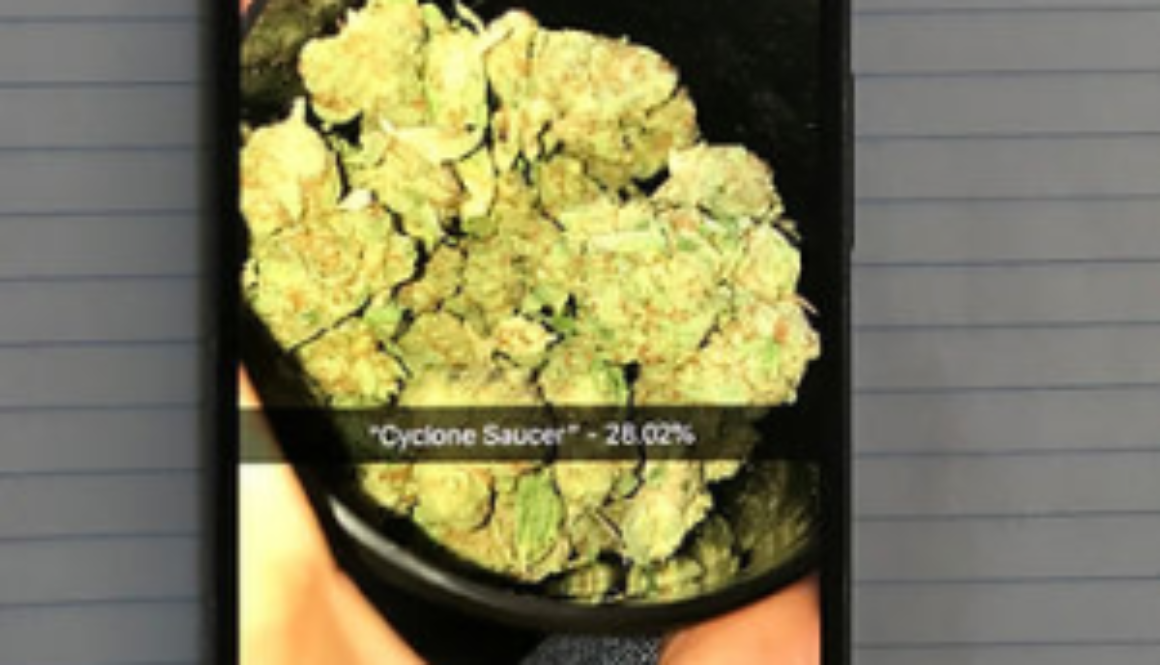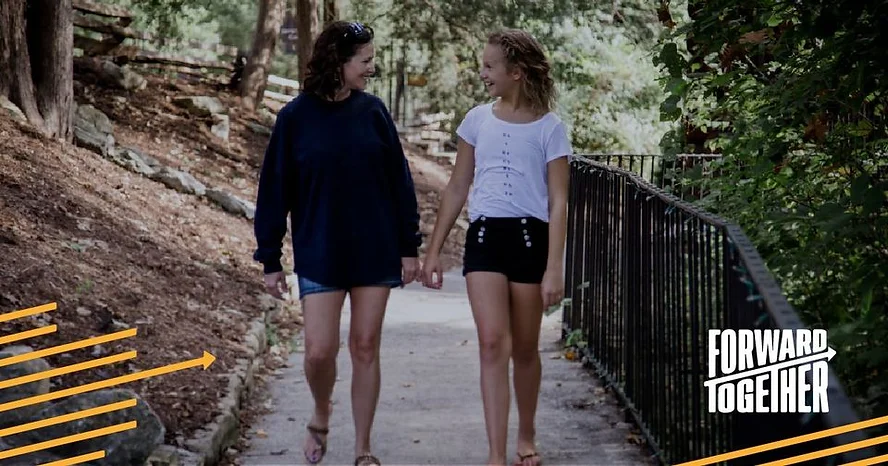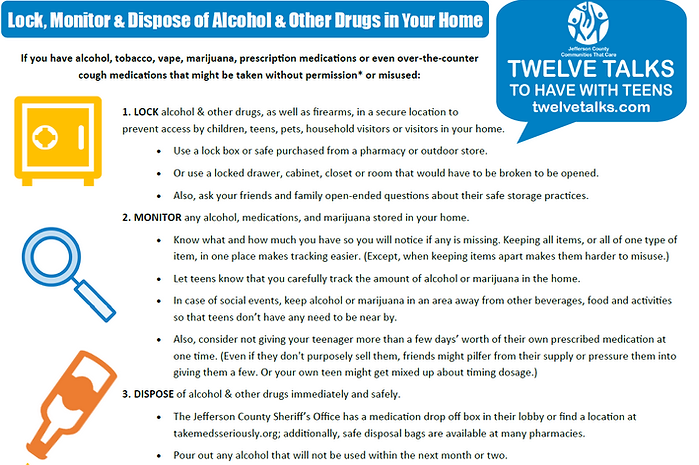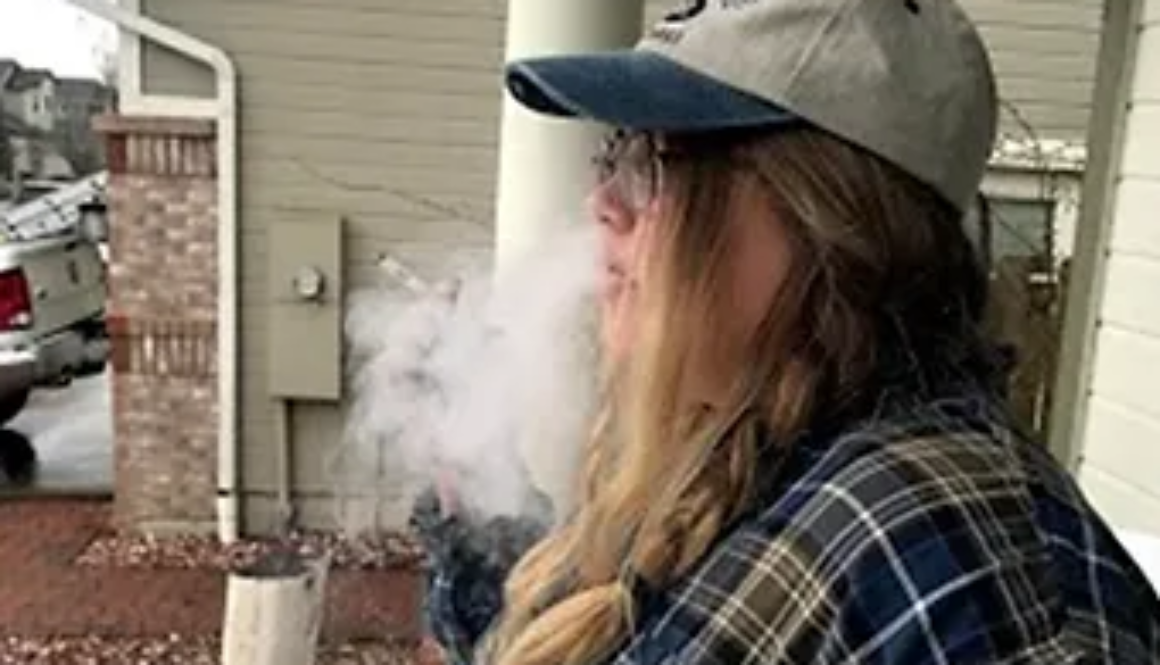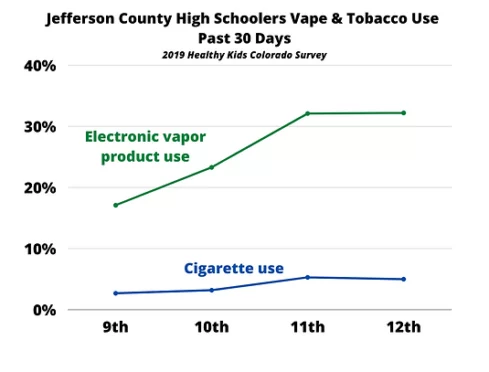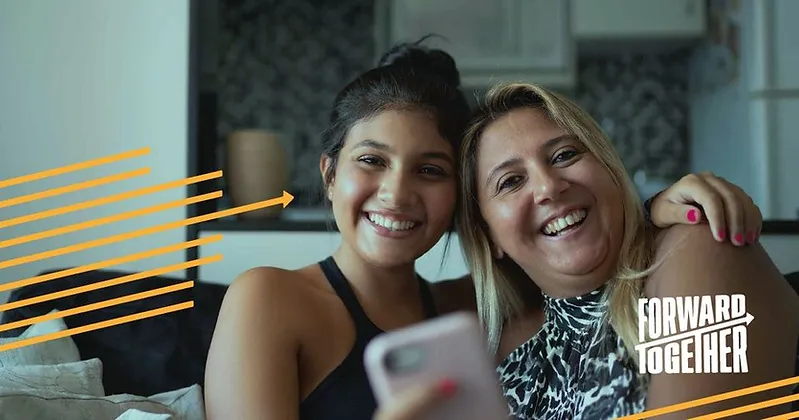Marijuana
Twelve Talks to
Have With Teens
Marijuana
Note: Jeffco CTC is in the process of shifting our language from “marijuana” to “cannabis.” Changes to language on the website will be gradual.
The term “marijuana” has been used historically to promote negative stereotypes and sentiments towards Hispanic and Latine/x communities. To avoid perpetuating these, we use the term “cannabis” to refer to hemp, “marijuana,” or any other substance derived from the flowering tops of the hemp plant and acknowledge that “marijuana” is a commonly used term in policies, laws, and regulations.
Use of marijuana during the teen years results in damage to the teen’s rapidly developing brain, and can result in impaired cognitive function. Plus, the younger a person starts using marijuana, the more likely they are to use harmful substances later in life.
- By the time they are juniors and seniors in high school, 25% of Jefferson County students report using marijuana in the past 30 days. Youth report that marijuana use is common across many social groups, including gifted students, athletes, and those with involved parents.
- What’s the problem with youth using marijuana?
- Marijuana is not always addictive to teenagers, but it can be. About 1 in 6 youth who use marijuana will become addicted, a number that increases the more the youth uses and the earlier they start.
- Youth who use marijuana regularly are more likely to have difficulty learning, memory issues and have lower math and reading scores. The more marijuana youth use, the harder it may be for them to learn. These effects can last weeks after quitting. Using marijuana before the age of 25 can also affect brain development and especially in high doses, can cause temporary psychosis (not knowing what is real, hallucinations and paranoia) while the user is high.
- In addition to its effects on the brain, marijuana smoke has other health effects. People who smoke marijuana daily or near-daily may have a persistent cough, bronchitis, mucus and wheezing. Marijuana smoke contains the same cancer-causing chemicals as tobacco smoke. Heavy marijuana smoking is strongly associated with tissue damage in the airways of your lungs.
- Marijuana can also affect athletic performance and coordination. THC can interfere with reaction time and how someone experiences time and space. Using marijuana in any form will likely impair a teen’s ability to drive, play sports or do other activities they enjoy.
In Jefferson County, youth report that most marijuana is purchased from someone old enough to buy or grow it; though many youths also say they take it without permission from an adult who lives with them (2018 Youth Town Hall).

Jefferson County High School Age Youth
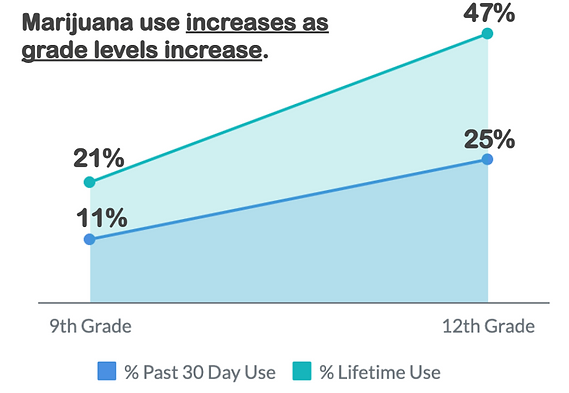
Healthy Kids Colorado Survey, 2019

Conversation starters
When you see an ad for marijuana or go past a marijuana store, use it as an opportunity to ask questions.
Ask them what they think about the new Healthy Kids Colorado survey data from 2019.
Talk with them about how marijuana is bought and sold, and about their thoughts on the ethics of youth helping distribute illegal substances. It’s also a good idea to let your youth know your values around dealers, or “plugs,” selling harmful substances to other teens.
Ask if they ever see people using marijuana at school or in the community— and ask if they see it used as edibles, dabs, vape or other form.
Watch together– and discuss– the Awkward Conversations video series. Hint: the fun part to watch with teens is the beginning. You may want to turn it off when the professionals begin their discussion!
Ask Yourself
- Are you being realistic? Assume your student has been exposed to marijuana and approach conversations with that assumption.
- Are you assuming use is typical when it isn’t? It’s a mistake to accept marijuana use as inevitable– fewer than half of Jeffco students report having ever tried marijuana by the fall of their senior year and only about 1 in 5 high school students report recent use.*
- Do you know the right words? Words related to marijuana change all the time. Here are a few to know:
- Plug: A person who sells alcohol, drugs or other things to people they know, often through social media
- Dab: Taking a dab means inhaling the vapors from a concentrated form of marijuana made by an extraction method that uses butane gas. Dabs, also known as butane hash oil (BHO) — and sometimes called “budder,” “honeycomb” or “earwax” — are more potent than conventional forms of marijuana because they have much higher concentrations of the psychoactive chemical tetrahydrocannabinol, or THC, than is found in regular marijuana.
- K2, Spice, Fake Weed: A mixture of plant material sprayed with a synthetic compound that is similar to THC.

Resources & Help

Rules & Boundaries
- Know where your teen is and who they are with when they are not at home.
- In Jefferson County, youth often teach each other how to use various forms of marijuana in homes where there is little or no supervision. If you go out of town, take these steps to prevent a “house party” from occurring at your home (pdf).
- If adults in your home use marijuana, make an agreement that they will never provide marijuana to those under 21. Also track the amount kept in the home and let your teens know you keep track of it. Even if your teen would never take these items without permission, locking them prevents your teen’s friends, younger children, visitors to your home and pets from accessing them.
- Keep alcohol, marijuana, prescription drugs and firearms in a locked cabinet or in locked room in your home.
Equity & Inclusion
-
Youth may be using alcohol, marijuana or other drugs to cope with boredom, conflict, trauma, depression, anxiety or stress. These problems can be exacerbated by lack of access to care or exposure to systemic inequalities. If your teen needs help, please consider reaching out to their Jeffco high school nurse for resources.
- Youth who are members of groups who currently face discrimination tend to be arrested more often, and face more severe penalties, for use and possession of marijuana. Black and Hispanic Colorado adults and youth continue to face disparately high marijuana related legal charges and school suspension. *
- Youth in Colorado are suspended or expelled from school or involved with law enforcement for underage marijuana use, and youth of color or youth that experience a disability are more likely to be disciplined than white youth in Colorado.
- Ask your school about their discipline practices and code of conduct. Ask how they are implementing health and substance use education. Ask about Jeffco’s restorative practices and how they are being implemented equitably for all students.

Taking Action in your Community
Reduction of risk factors, and improvements in protective factors, can happen on multiple levels– within an individual, among friends and family, by adjusting systems in places like schools or businesses, and on the policy level for towns, counties or states. When improvements happen on all levels, our teens are most likely to thrive. Here are some policy and systems you and/or your teens might be able to influence:
- Many Jeffco youth learn from other youth how to use marijuana, particular dabs and oils, at parties or gatherings in private homes. Cities can pass laws to fine homeowners or leaseholders when they allow youth to consume substances on their property.
- Join Jeffco CTC to address local policies and efforts that support youth.
- Cites can restrict marijuana promotions, signage, merchandising, location, etc. These types of policies may help reduce youth marijuana use.
- Join Jeffco CTC to address local policies and efforts that support youth.
- The amount and content of health education students receive (including information about substance misuse and effective skill development) varies by school.
- Ask your school how they are implementing health education for all students. Ask if the school knows about Jeffco’s Health Education Policy and related resources. Also, encourage your teen to take a high school health education elective.
- Having data in our county on youth marijuana use and behaviors helps to bring in resources and support for youth.
- Email the local Board of Education (see example letter here) to share your support for the Healthy Kids Colorado Survey to get important information on youth needs in our community.
- Join your School Accountability Committee and ask about using non-academic data and information (e.g., health information, climate survey data, etc) to guide school improvement efforts and plans.
* Healthy Kids Colorado Survey 2019, Jefferson County data; **Jefferson County CTC Youth Town Hall data 2019, 2020 & 2021.
This resource is maintained with funding from a Coalitions Organizing For Prevention grant from the Colorado Department of Public Health and Environment and a Drug Free Communities Grant from the Centers for Disease Control. The views, policies and opinions expressed are those of the authors and do not necessarily reflect those of the grant providers.

